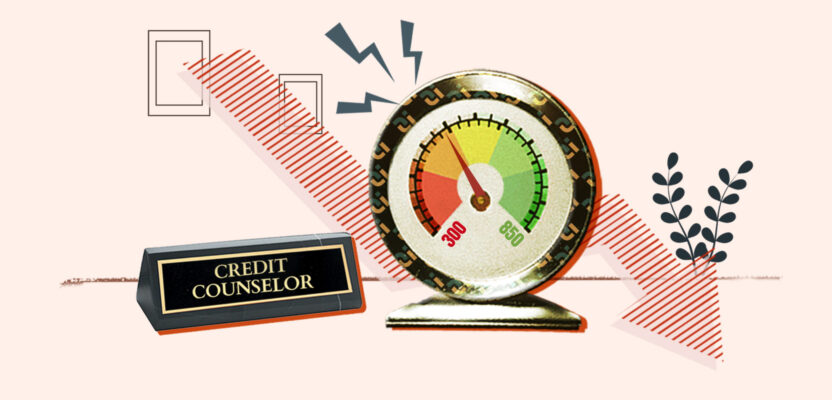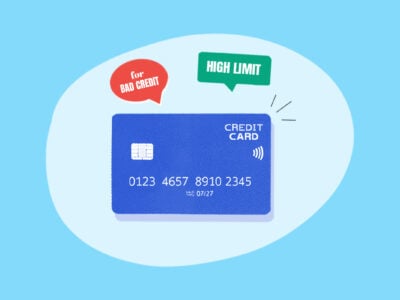If you’re struggling to get out of debt, credit counseling can be a great way to escape a relentless debt cycle. However, if you’re considering this option, you may be wondering how credit counseling will affect your credit score. Will it improve it, or will it damage it?
Before getting started, find out how credit counseling can affect your credit and what services you can expect from a certified credit counselor.
Table of Contents
What is credit counseling?
Credit counseling is a debt-relief service provided by qualified credit counselors. Depending on your financial situation and your needs, credit counselors can offer:
- Budgeting advice
- Money management workshops
- Educational resources
- Enrollment in a debt management plan (DMP)
The last feature—debt management—is actually what most people are referring to when they talk about “credit counseling.” When you sign up for a DMP, your credit counselor negotiates with your creditors and debt collectors on your behalf to get you concessions like lower interest rates or monthly payments.
How credit counseling can hurt your credit score
Getting advice or resources from a credit counselor won’t hurt your credit score, so don’t worry about setting up an initial consultation—there are no downsides.
However, if you take the plunge and enroll in a DMP, that may entail doing things that will hurt your credit, such as:
Closing your credit accounts
When you start a DMP, your credit counselor may ask you to close your credit cards and other credit accounts to prevent you from accumulating more debt. Doing so will lower the amount of available credit you have, which will hurt your credit score by causing an increase in your credit utilization rate (i.e., your debt-to-credit ratio).
Another downside is that your closed credit accounts will eventually be deleted from your credit reports and will stop contributing to the length of your credit history. However, this will take 7–10 years to happen, so you don’t have to worry about that in the short term. 1
Pursuing debt settlement (not fully repaying your debts)
Although debt management is different from debt settlement, it’s still possible that your credit counselor will advise you to pursue a settlement—an agreement where you clear your debts for less than you actually owe.
If your creditor agrees to accept a partial repayment of your debt, they may mark your account as “settled” instead of “current” or “paid in full.” 2
Debt settlement hurts your credit score. The mark will take up to 7 years to come off your credit reports, so weigh this option carefully if your credit counselor suggests it. 1
Missing payments
If you stop paying your credit counselor while enrolled in a DMP—for instance, if you experience a true financial emergency and simply don’t have enough money—your credit score will suffer from late payments.
Because your credit counselor distributes your payment to all your creditors, missing one payment could lead to multiple delinquencies: one for each account you included in your DMP. In other words, a DMP can make a single missed payment more damaging than it normally would have been.
When making the decision to enroll in a debt management plan, it’s important that you ensure that you’ll be able to make all your payments. Missed payments can do a lot of harm to your credit because they affect your payment history, which is the largest factor affecting your credit score.
Does credit counseling show up on your credit report?
If you enroll in a debt management plan, your creditors may add a comment to your credit reports stating that you’re repaying your debt via a DMP.
While the notation won’t affect your credit score, it may still affect your eligibility for future loans. Lenders will be able to see it when they review your credit reports, and they’ll know that you struggled with paying off your debts (at least at one point). 3
Is credit counseling worth it?
Whether credit counseling is a good idea depends on your current financial situation. Be sure to understand its pros and cons before committing.
Here are a few points to bear in mind:
- Only unsecured debts are eligible for DMPs: Debt management plans only help you pay off unsecured debts, such as unsecured loans or credit card bills. Although credit counselors may be able to offer advice about secured loans (like your mortgage or auto loan), they probably won’t be able to help you directly.
- You might need to pay: Although credit counseling agencies generally offer free resources and workshops, if you want to sign up for a debt management plan, it’ll probably cost money.
- It’s not the only way to get out of debt: If your debt isn’t out of control, you can also try managing your debts on your own. For example, you can ask your creditors about signing up for a hardship program, or consolidate your debts using a personal loan or balance transfer credit card.
Credit counseling isn’t the same as credit repair
If you’re thinking about signing up for credit counseling, it’s also important to know how it’s different from credit repair. Credit counseling and credit repair are services that people often get confused, but they’re very different.
In brief, credit counseling is designed to get you out of debt; your credit score isn’t a significant focus. Credit repair, on the other hand, is specifically designed to improve your credit score.
The table below shows the differences between these services more clearly:
Credit Counseling vs. Credit Repair
| Credit Counseling | Credit Repair | |
|---|---|---|
| What it does | Counselor gives you advice and guidance to help you stay out of debt. | Company takes action on their own to help you remove negative marks from your credit report. |
| Costs | Typically free, unless you enter a debt management plan (DMP). | Charges a service fee. |
Where to find a certified credit counselor near you
To avoid getting scammed or ripped off, check the following websites for certified credit counseling agencies near you:
- The National Foundation for Credit Counseling
- The Financial Counseling Association of America
- The U.S. Trustee Program
- Your state’s attorney general’s office
- Your local consumer protection agency
If you choose to sign up for a DMP, check your credit score and credit reports to find out how the plan may affect your credit. You can also ask your counselor about this—if they’re trustworthy and legitimate, they’ll be upfront about the possible consequences.
Credit counselors can pull your reports and tell you what your FICO score is, but you’re also entitled to free copies of your credit reports from each of the three main credit bureaus (Experian, Equifax, and TransUnion), which you can get at AnnualCreditReport.com. 4 Review your reports carefully before committing to anything your credit counselor proposes.
Takeaway: Credit counseling alone won’t hurt your credit, but enrolling in a debt management plan might.
- Credit counseling agencies provide a range of debt-relief services, and they’re a good place to turn to if you need help budgeting or paying off your debts.
- Credit counselors offer debt management plans (DMPs), where they negotiate with your creditors for lower interest rates or lower monthly payments for your unsecured debts.
- DMPs can hurt your credit if you’re required to close your credit accounts, you miss payments, or your creditor marks your account as “settled.”
- Your enrollment in a DMP won’t directly affect your credit score, but lenders may be able to see that you’re in a DMP when you apply for a new credit account.
- Credit counseling isn’t the only way to get out of debt. You can also manage your debts by getting hardship assistance from your creditors or consolidating your debts.







